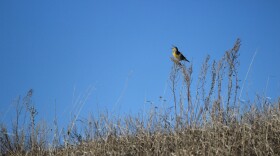2023 is drawing to a close, and 2024 will begin on Monday. But of course, the new year hasn't always been determined by a calendar date.
If you go back far enough, I suspect that the annual cycle of the seasons was based on equinoxes or solstices. The first new moon following the spring equinox marked the beginning of the new year for ancient Babylonians. The Classical Greek calendar and several Roman calendars marked the new year in association with the summer solstice.
Now, of course, the Gregorian calendar marks the new year on January 1. From what I can gather, it has no significance other than the Romans apparently decided that the new year should begin with the terms of Roman counselors, and they named the first month January after Janus the Roman god of beginnings. So, January 1 it is.
What do you associate with a new year? Would it be some observation of nature? Or maybe it's in the spring, sighting the first robin, the first flock of geese flying overhead, or Pasque flowers blooming?
New Year's Day does mark the beginning of the Quadrantids meteor shower. It puts on its annual show January 1-5.
The Quadrantids are considered to be an above-average meteor shower with up to 40 meteors per hour. The peak viewing period will be on the evening of January 3 and early morning hours of January 4. The moon will block out some of the fainter meteors, but if the sky is clear, there could be some good viewing.
The Quadrantids are a little different compared to other meteor showers. Meteor showers are named after the constellation in which they appear to originate. In this case, it is Quadrans Muralis, a constellation no longer officially recognized by the International Astronomical Union.
It was, and unofficially still is located near Hercules and Bootes. So rather than change the name of the meteor shower, they just left it as is. And the Quadrantid meteor shower is a short shower, lasting only five days. Apparently, the meteor belt is close to perpendicular to the earth’s orbit, so the earth moves through the belt rather quickly.
So, here is wishing you and yours a Happy New Year! And I encourage you to make the Quadrantid meteor shower a part of your New Year's celebration.
—
Further Reading:





